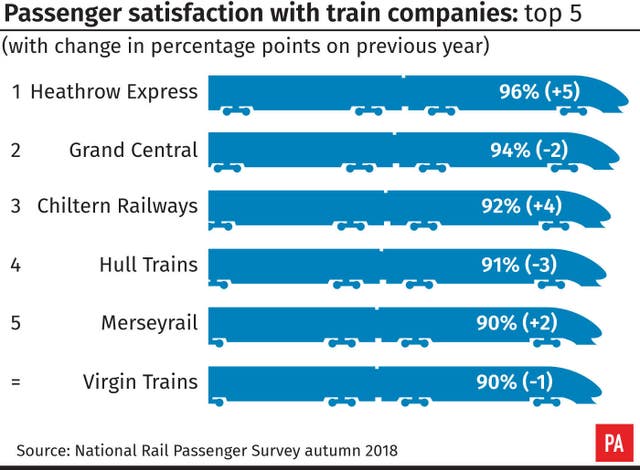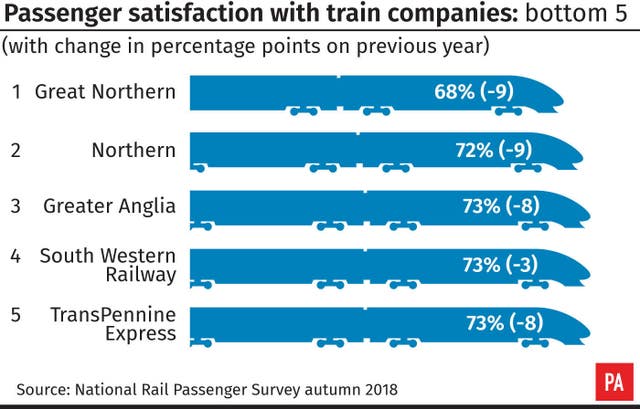
Passenger satisfaction with rail services has fallen to a 10-year low after the industry was plagued by a series of issues.
The autumn 2018 Transport Focus survey of more than 25,000 passengers found that overall satisfaction was 79%.
This is down two percentage points year-on-year and means one in five passengers were not satisfied.
Published: latest National Rail Passenger Survey results https://t.co/FYiizqo3Dn
Overall satisfaction falls to 79% in autumn 2018 – down from 83% in 2008. #passengervoice
One in five rail users not satisfied. Government and the industry must continue to focus on performance. pic.twitter.com/Wges7kyOJa
— Transport Focus (@TransportFocus) January 29, 2019
Transport Focus said passengers are less happy now than at any time since 2008 due to poor punctuality, the timetable chaos of last summer and continued disruption due to strikes.
Its National Rail Passenger Survey was conducted between September 1 and November 16 last year.
Transport Focus chief executive Anthony Smith said passengers’ irritation at poor performance “erodes their most basic trust in the industry”.
He added that the Government’s Rail Review – being carried out by former British Airways chief executive Keith Williams – must “bring about fundamental change”.

Jacqueline Starr, managing director of customer experience at industry body the Rail Delivery Group, acknowledged that “in too many places we are not getting it right” in terms of delivering punctual services.
She said there is a “long-term plan to rebuild key parts of the network”.
A Department for Transport spokesman described passenger satisfaction as “an absolute priority” and insisted the Government’s “£48 billion investment will help to modernise the network and deliver significant improvements”.
Comparing the percentage of journeys that passengers rated as satisfactory with the same measure in autumn 2017, Heathrow Express and Chiltern Railways were the only two out of 25 train companies to have significantly improved.
Over the same period, seven operators recorded a significant decline in satisfaction. They were Great Northern, Northern, TransPennine Express, Greater Anglia, Thameslink, ScotRail and London North Eastern Railway.
Thank you for rating us top in the UK with 96% Overall Satisfaction in the latest National Rail Passenger Survey! We look forward to welcoming you on-board again soon. https://t.co/G1zpGfPIgW pic.twitter.com/pGuIqljr0c
— Heathrow Express (@HeathrowExpress) January 29, 2019
The highest rating was achieved by Heathrow Express at 96%, while the lowest was recorded by Great Northern at 68%.
Patrick Verwer, chief executive of Govia Thameslink Railway – which includes Great Northern and Thameslink – said the results for those brands reflect the May timetable disruption which was caused by “industry-wide factors”.
He added that their performance was now “firmly back on track”.
Across the whole of Britain, just 71% of journeys were rated as satisfactory for punctuality/reliability, compared with 74% in autumn 2017.
Among commuters, 31% of those surveyed expressed satisfaction with the value for money of their journey, down one percentage point year on year.
Passenger satisfaction with how train operators dealt with delays ranged from 29% by Southern and Thameslink to 77% by Grand Central.

In London and the South East, the proportion of journeys deemed very or fairly satisfactory fell by two percentage points compared with the previous autumn, to 78%.
Satisfaction for those travelling with long-distance operators dropped from 86% to 83%, while regional operators saw a decline from 83% to 79%.
Shadow transport secretary Andy McDonald claimed the survey “demonstrates the gulf between the Government’s empty rhetoric and the real-world experience of rail passengers”.
Rail, Maritime and Transport union general secretary Mick Cash accused train companies of “laughing all the way to the bank” as he called for services to be brought back into public ownership.


Comments: Our rules
We want our comments to be a lively and valuable part of our community - a place where readers can debate and engage with the most important local issues. The ability to comment on our stories is a privilege, not a right, however, and that privilege may be withdrawn if it is abused or misused.
Please report any comments that break our rules.
Read the rules here